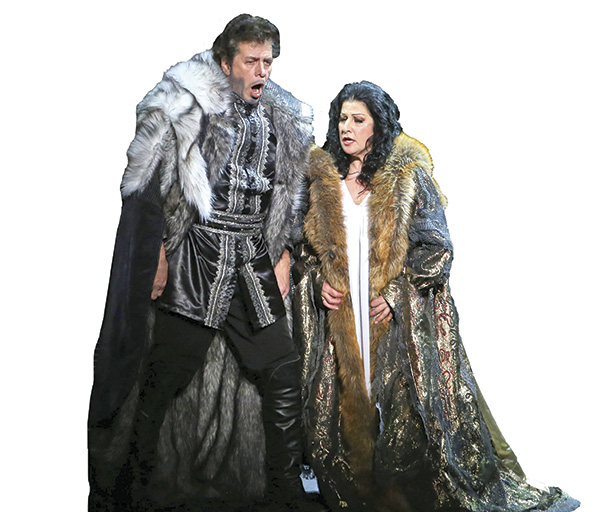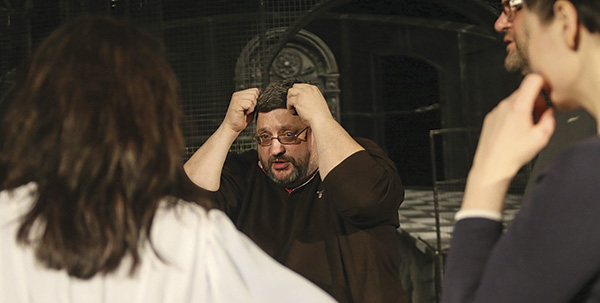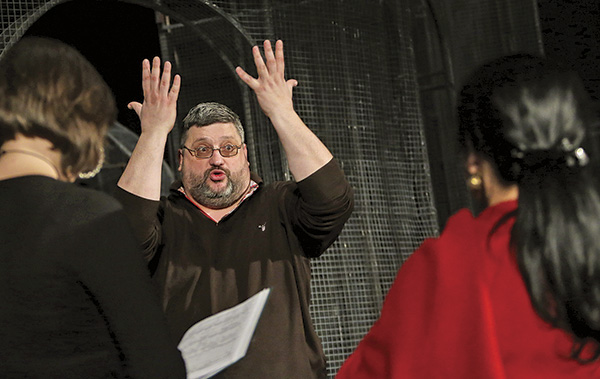‘Мacbeth’ is one of Verdi’s most mystical operas, exploring the path of ‘choosing’ evil, by which we lose our humanity; why light prevails in one soul while the darker side dominates another. 2016 marks the 400th anniversary of the death of William Shakespeare, upon whose play the opera is based. Critics call Macbeth one of the most powerful and philosophical works in our literary canon, so it’s little wonder that it inspired Verdi to write such expressive music, filled with emotion and contemplation.

Lady Macbeth’s fur coat with a fox head weighs around 6kg. ‘Macbeth’ played by Vladimir Petrov and Lady Macbeth — by Nina Sharubina
The Bolshoi Theatre and its production group deserve praise for this performance. Meanwhile, it is not the first time the theatre has staged this opera. The premiere of concert versions of ‘Macbeth’ took place on the stage of the Yakub Kolas National Academic Drama Theatre in Vitebsk in 2008 and on the stage of the renewed Opera and Ballet Theatre in 2010.
‘Macbeth’ is the theatre’s six opera staged on Giuseppe Verdi’s music, alongside ‘Aida’, ‘A Masked Ball’, ‘Rigoletto’, ‘La Traviata’ and ‘Nabucco’. According to Victor Ploskina, the director and stage manager of the new opera, there’s nothing better in operatic art than Verdi’s music.
It took me a long time to understand why this Shakespeare’s work, whose plot was borrowed from the Chronicles of England, Scotland and Ireland, was Verdi’s most favourite. Why did such a bloody drama so deeply impress the composer and why does his ‘Macbeth’ have so many melodies of love, tenderness and other soul-elevating feelings, despite having so much dark and cruelty?..

When I heard the overture during the premiere and passionate, breath-taking sounds were replaced with a melody, full of deep sorrow and compassion, I wondered where does this composer’s sorrow (penetrating directly into human hearts) come from? During the act-wait I’ve made a discovery for myself: we are powerless before the mystery of existence. I think I won’t be mistaken if I make a suggestion that Verdi, following Shakespeare, clearly wrestled with the question of why we struggle to understand our motivations: of why we choose ill-deeds, of what circumstances inspire ‘black holes’ in the soul, and whether evil exists as a force in itself. Such musings can make us feel helpless, as if ‘crushed’ by the unexplainable. However, Verdi’s opera offers not just darkness, but light, and a sense of humility in the face of the ‘eternal’.
If we look on the final of the opera we see that the justice has as if been met: Macbeth, Duncan’s assassinator, is defeated and an heir is set on a throne, while witches, embodying evil powers in the performance, are close to the king’s son and his courtiers. Soloists and ballet artistes are always on the stage and should constantly ‘fit’ the actions on the stage. During the premiere these roles were played by Igor Matskevich, Ivan Savenkov and Dmitry Shemet.

However, are witches really so malicious? They rather represent a neutral power which people turn either into the evil or into the good. That’s why witches don’t look demonic and awesome in the performance. They are rather spirits of the earth or some substances, playing either in good or in evil. The opera’s expressive means are subject to this idea and it’s not accidentally that either black, or white, or red blankets appear on the stage while illustrating the internal world of restless characters, and even their purity…
Items, stage and people transform in ‘Macbeth’. Costumes are also well designed which is an indispensable merit of costume designers Vyacheslav Okunev and Maria Moroz. Of course, the major image of the performance ‘works’ well — the web that falls in the form of a holed curtain and as if swallows up the space.
The production focuses on our free will, since Macbeth shapes his own path and choices, as we all do. Director Mr. Pandzhavidze explains that Shakespeare has Queen Hecate call Macbeth ‘a wayward son, spiteful and wrathful, who, as others do, loves for his own ends’. Yet, the mystery remains as to what inspires this side of our nature.

‘Macbeth’ is a big success of the theatre. It couldn’t be otherwise, since our Bolshoi Theatre is highly professional, able to solve complex artistic tasks. The opera is large-scale, psychological and deeply dramatic, with focus placed on actors’ performance and dialogues between the characters.
I like Mr. Pandzhavidze’s opinion that everything with ‘Macbeth’ has been invented before him and it was very difficult to invent something new. However, the opera does have the fresh view and director’s interpretation. Mr. Pandzhavidze admitted that that he has seen many performances and doesn’t remember that any of them had three witches rather than the choir, like in Shakespeare’s work.

‘Macbeth’ opera involves a great deal of artistes; 260 costumes were necessary to dress all
Mr. Pandzhavidze has staged many performances at the Bolshoi Theatre proving his advantages as a production director and he enjoys positive opinion (as a master) among fans of operatic art and music experts. Moreover, he has received several awards. Last year, e.g., the Bolshoi Theatre was awarded an annual Special Presidential Award ‘For Spiritual Revival’ for their ‘Tsar’s Bride’, staged by Pandzhavidze. Mr. Pandzhavidze’s strong directorial hand and ability to work in tandem with talented set designer Alexander Kostyuchenko has resulted in a well-planned stage space, where voices resound and everything appears professional.

Like in the work over other operas, in ‘Macbeth’ Mr. Pandzhavidze liaises with choirmaster Nina Lomanovich.
We are well aware that live, expressive and mobile choir at Bolshoi is its zest. I won’t be mistaken if I remind the readers that it has already taken part in Mr. Pandzhavidze’s performances. Personally I listen to the Bolshoi Theatre choir ecstatically watching how each of its singers lives his own ‘small life’. The same happened at the premiere of ‘Macbeth’, with the female choir performing while seating, lying and moving along the stage.


It’s very pleasant when Mr. Pandzhavidze delightedly speaks about his artistes. They are experienced, intellectual, plastic and open for training. Three singers were rehearsing the role of Macbeth: Vladimir Petrov, Stanislav Trifonov and Vladimir Gromov. The most complex arias of Lady Macbeth are performed by Nina Sharubina, Tatiana Petrova, Tatiana Tretyak and Yekaterina Golovleva. According to Mr. Pandzhavidze, the director’s idea was grasped by the actors on the fly and his focus on the intelligible dramatic performance was understood and accepted which was once very important for Giuseppe Verdi — the creator of music, full of senses and historical revelations.
On the premiere day the primary arias — very complex from the acting and musical points of view — were brilliantly performed by Vladimir Petrov and Nina Sharubina.
By Valentina Zhdanovich











